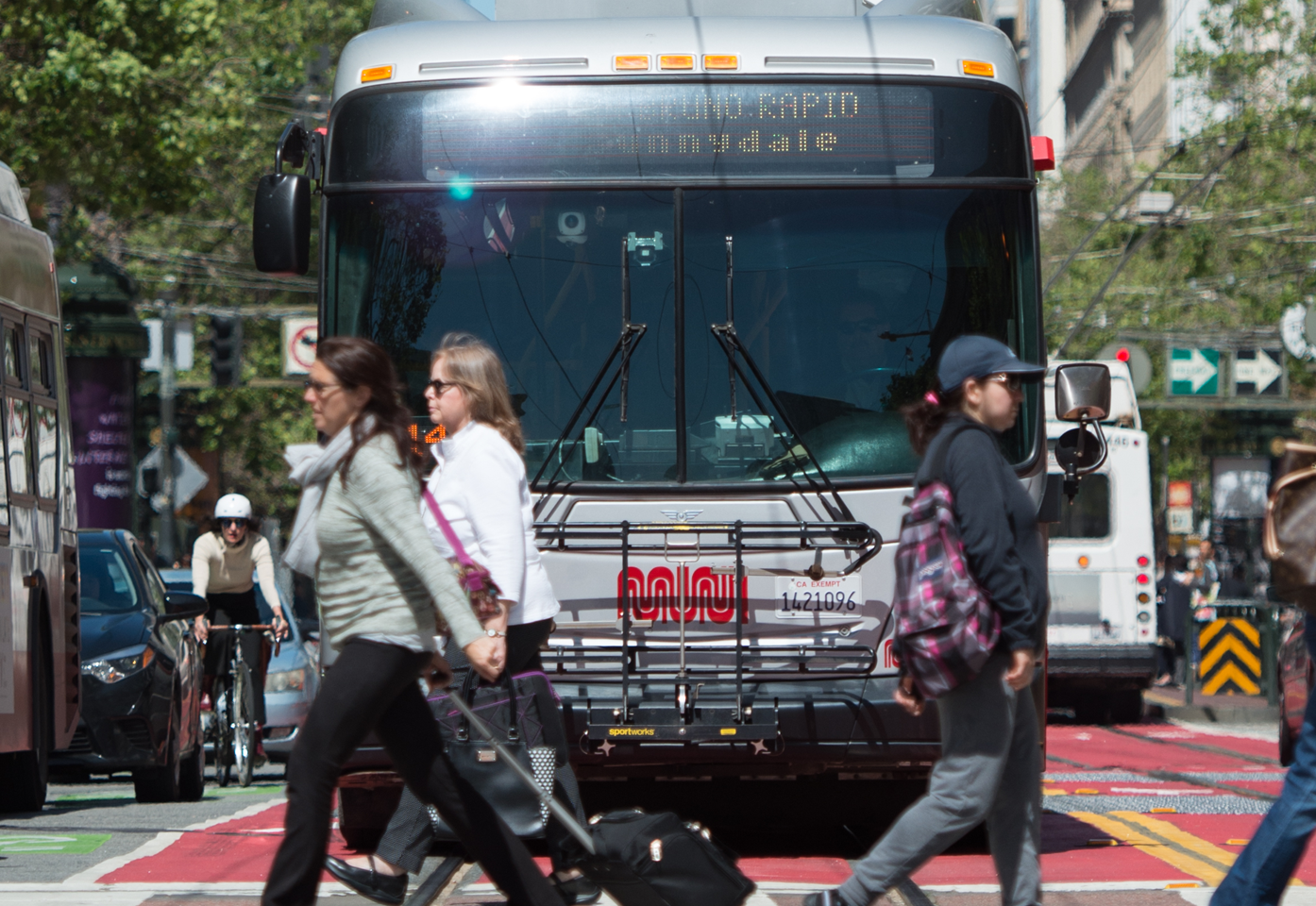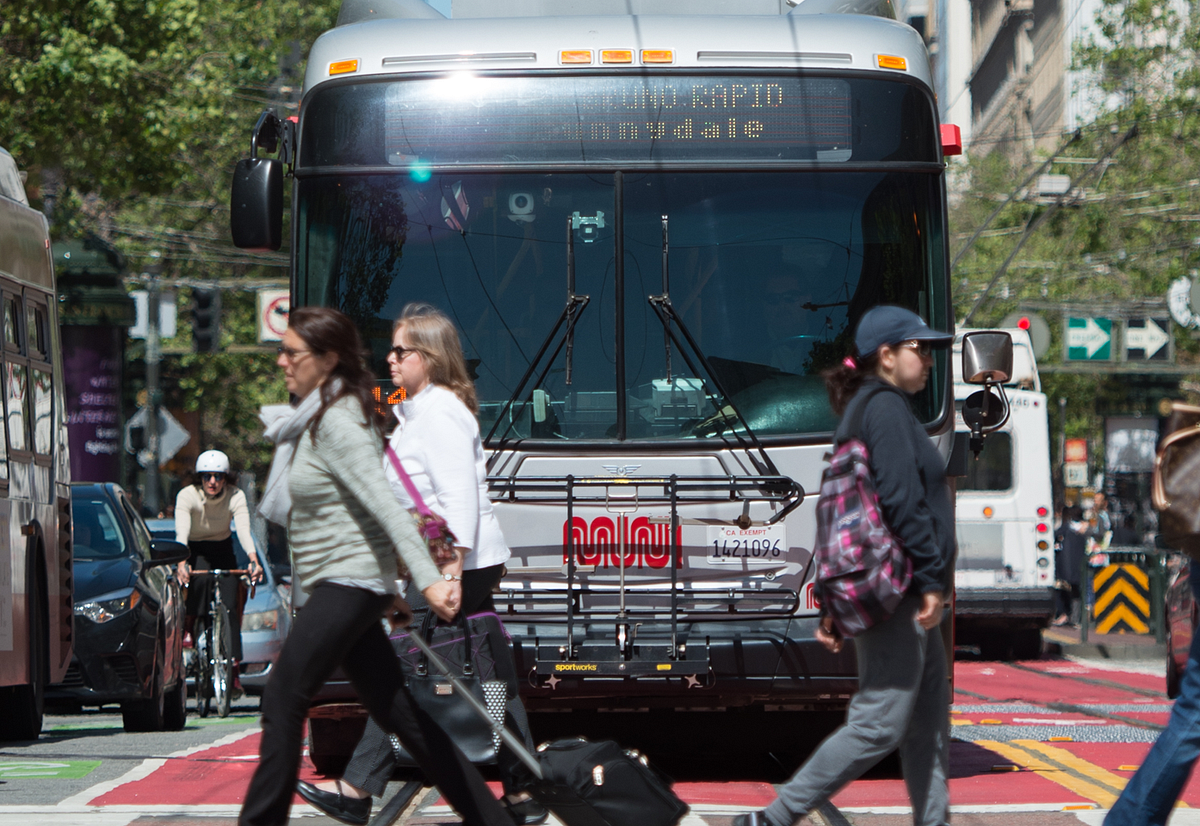
One hour, 8 minutes. That was the length of my commute home today. Not by car, not by bike, not by foot, but by Muni. It’s already close to 10:00 p.m., and you’d think that I would have just opted for an Uber or a Lyft home by now, but part of me resisted that.
I started taking Muni in high school. When friends began getting their driver’s licenses, I still stubbornly clung to the 29 and the graciousness of my friends or my mom for letting me catch a ride. In high school and even now, I have always associated Muni with a sense of access to the city. With a swipe of a card, I can get anywhere. Never mind the few transfers along the way. Never mind that it’s occasionally so crowded that I (used to) fear I wouldn’t be able to get off in time before the doors closed. Someone else was driving; it cost $2.25; and that was prime time to finish the algebra homework I had barely started.
When I ask a friend what they think about Muni, their explanation usually ends in complaint. People say it’s too slow and crowded, or that the buses don’t come frequently enough.
I’ll admit that perhaps there’s a hint of irrationality to my commitment. When I ask a friend what they think about Muni, their explanation usually ends in complaint. People say it’s too slow and crowded, or that the buses don’t come frequently enough. Sometimes, I feel this exact way too — I’ll get to the 1 bus stop at night and realize that there’s a 20-minute wait out in the cold. Or, the classic scenario: I really need to get somewhere on time, and just as I am half a block away, I miss the 29 by a hair. Panting from the exhaustion of running to the stop, I feel frustrated with Muni because it failed to suit my schedule.
Each ride reminds me how big such a small city can feel; every creaky turn and jolting stop gives me the chance to slow down and experience the full measure of San Francisco.
But I grew up on this bus system. Muni has always allowed me to get where I needed to go, even if it’s never at the exact time or pace I want. Each ride reminds me how big such a small city can feel; every creaky turn and jolting stop gives me the chance to slow down and experience the full measure of San Francisco. I may be running around all day, but when at last I sit and the doors close, I’m able to ease into the carriage of the swaying bus. I relish the meandering streets that bring me throughout San Francisco’s eclectic neighborhoods all the way home. For that one hour and 8 minutes, I give into thought, to idly glancing at strangers, to observing the Victorian houses and restaurants that pass by. It’s a gift to have this opportunity for pause in a long day.
In a city that is constantly shifting, Muni keeps me grounded. Some people take Lyft so frequently, they don’t question it. They stop looking out the window.
In a city that has been overrun by tech and clogged with Uber — and soon enough, driverless taxis — there is still a way to get around that reminds us of our own connectedness to the city and one another. In a city that is constantly shifting, Muni keeps me grounded. Some people take Lyft so frequently, they don’t question it. They stop looking out the window. They forget that opening an app and waiting a few minutes to be picked up and magically zipped somewhere alone is a privilege.
But at any given time, a Muni bus ferries a diverse cross-section of San Franciscans across town: a group of elementary-school kids, the elderly, people in suits, the homeless. For a fleeting moment, passengers share a common bus ride, though they head to separate destinations. Riding Muni reminds me that my life is not just parallel to my fellow San Franciscan, but in constant intersection.
The other day, I caught the 19 and witnessed a uniquely San Francisco chain of kindness unfold on the bus.
An elderly Asian woman boarded with a huge cardboard box of groceries, despite having an arm in a cast. A teen standing near her pulled the box out of the way of the entrance. Once they were both seated, the elderly woman pulled out a bright green apple and held it out to the teen. At first the young man tried to push it back, saying, “No, thank you.” But she insisted, and before I knew it, three more apples appeared, one by one from her bag. At this point, the young man knew better than to refuse. The woman asked with a grateful and gentle smile, “What is your name? Thank you for helping me.” By the time the fourth apple appeared, a tear had begun to fill my right eye.
Soon enough, a Caucasian man with white hair and sunglasses came on board carrying a skateboard and an equally impressive load of groceries. The Asian woman offered to hold his skateboard for him with her mobile arm while he settled in. The skateboard was taller than her small, seated form. When he finally sat down, they began chatting gregariously. They had just come from the same food bank as one another. Soon enough, they exchanged names, and not long after, they were exchanging groceries. The little boy in the seat next to the old man even helped him locate the peanut butter in his gargantuan mesh bag. The African American woman to my left said with a hint of laughter and skepticism on her tongue, “Are they sharing groceries?” And with a smile, I said, “I think they are.” Together we looked on, as amusement played across our faces.
The image of the old woman handing this stranger a cascade of green apples stays with me. When I first saw it, I was touched and close to giddy due to my disbelief at such an open display of kindness. I couldn’t remember the last time I had witnessed generosity in public like that—so willing, so overflowing with gratitude. Is this not what giving should be? What seemed so simple and yet so powerful was the fact that each small act inspired the organic unfolding of the next. If the young man had not helped the woman with her groceries, would she have held her fellow passenger’s skateboard and received food in return?
When it’s late and my friend suggests I take an Uber home, I usually tell her I’d rather stick with Muni.







